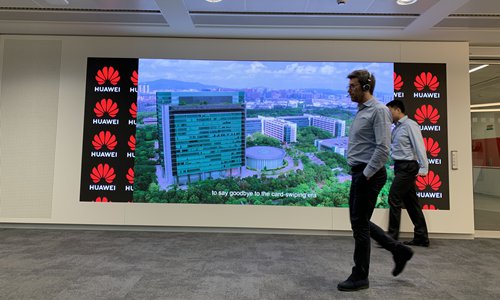

R&D investment, innovation edge help withstand US crackdown

Employees pass by a screen showing Huawei's innovation roadmap at its office in Milan, Italy, on February 28. Photo: Chen Qingqing/GT
Huawei will continue to lead in the 5G telecommunications space with substantial influence and significant contributions despite a US-led geopolitical crackdown, as it has taken a leading position by continuously investing in research and development (R&D) and prioritizing innovation.
Huawei filed the largest number of patent applications among all companies with the World Intellectual Property Organization (WIPO), a specialized agency of UN, worldwide in 2018, and industry insiders said that continuous investment in R&D and a focus on new technologies is helping China forge ahead in global patent applications.
The Shenzhen-based company - the world's largest telecoms equipment provider - filed a record 5,405 patents in 2018, the highest among corporate filers, the WIPO said in a report released on Tuesday. Next came Japan-based Mitsubishi Electric Corp, followed by US technology giants Intel and Qualcomm.
The US remained the largest applicant globally in 2018, with a total of 56,142 patents filed, down 0.9 percent from 2017. China is now the second-largest patent applicant with 53,345 filed in 2018, up 9.1 percent year-on-year, the report showed.
"Asia is now the majority filer of international patent applications via the WIPO, which is an important milestone for that economically dynamic region and underscores the historical geographical shift of innovative activity from West to East," Francis Gurry, director-general of the WIPO, was quoted as saying in the report.
Chinese lead
Huawei invests about $15-20 billion in R&D annually, ranking in the top five among global companies, company founder Ren Zhengfei said during a group interview in January.
"We have obtained 87,805 licensed patents, of which 11,152 are core technology patents in the US, and we have participated in more than 360 standards organizations and contributed over 54,000 proposals," he said, explaining why Huawei is competitive in the telecom industry.
The company has filed more than 129,000 patent applications as of now, among which wireless telecom patents exceeded 44,000, according to the latest figures provided by Huawei.
"Our R&D investment is at the global forefront, and this is also the top priority of the company's founder Ren," a Huawei spokesperson told the Global Times on Tuesday.
Huawei's major rival ZTE Corp also ranked among the top five applicants in the WIPO report, with a total of 2,080 patent filings in 2018.
"China accounts for about 10 percent of all 5G-related patents, which is also in line with the government's ambitions in leading the 5G era," Li Zhen, an industry expert at Beijing-based CCID Consulting, said in explaining why the number of patent filings by Chinese companies surged in 2018.
Absolute advantage
"Our absolute competitive advantage in 5G is also another reason [for the lead in global patent applications]," the Huawei spokesperson said.
The year of 2018 was a key year for 5G development, and Huawei has been concentrating its research efforts on the next generation of wireless technologies since 2009.
The number of patents Huawei filed that were related to 5G also accounted for a large part of all the patent filings by the company, the spokesperson said.
Despite the US-led global crackdown on the Chinese company, industry representatives have acknowledged that Huawei is a leading 5G player with the highest count of 5G 3GPP contributions and therefore not easily substitutable.
The New York Times said on Sunday that the US campaign to ban Huawei overseas is stumbling as its major allies resist.
"Huawei is one of the leaders in the 5G space with substantial influence and significant contributions," Charlie Dai, principal analyst at American consultancy Forrester, told the Global Times on Tuesday.
According to the latest figures intellectual property tracker IPlytics GmbH published in February, Huawei holds 1,529 5G standard essential patents, ahead of Nokia, which holds 1,397. Samsung has 1,296 and Ericsson holds 812, the analyst noted.
"Technically it is possible to find workarounds regarding Huawei's technology, but it would be a huge waste of money and not beneficial for the whole ecosystem," he said. `
 Fire brigade in Shanghai holds group wedding
Fire brigade in Shanghai holds group wedding Tourists enjoy ice sculptures in Datan Town, north China
Tourists enjoy ice sculptures in Datan Town, north China Sunset scenery of Dayan Pagoda in Xi'an
Sunset scenery of Dayan Pagoda in Xi'an Tourists have fun at scenic spot in Nanlong Town, NW China
Tourists have fun at scenic spot in Nanlong Town, NW China Harbin attracts tourists by making best use of ice in winter
Harbin attracts tourists by making best use of ice in winter In pics: FIS Alpine Ski Women's World Cup Slalom
In pics: FIS Alpine Ski Women's World Cup Slalom Black-necked cranes rest at reservoir in Lhunzhub County, Lhasa
Black-necked cranes rest at reservoir in Lhunzhub County, Lhasa China's FAST telescope will be available to foreign scientists in April
China's FAST telescope will be available to foreign scientists in April "She power" plays indispensable role in poverty alleviation
"She power" plays indispensable role in poverty alleviation Top 10 world news events of People's Daily in 2020
Top 10 world news events of People's Daily in 2020 Top 10 China news events of People's Daily in 2020
Top 10 China news events of People's Daily in 2020 Top 10 media buzzwords of 2020
Top 10 media buzzwords of 2020 Year-ender:10 major tourism stories of 2020
Year-ender:10 major tourism stories of 2020 No interference in Venezuelan issues
No interference in Venezuelan issues
 Biz prepares for trade spat
Biz prepares for trade spat
 Broadcasting Continent
Broadcasting Continent Australia wins Chinese CEOs as US loses
Australia wins Chinese CEOs as US loses